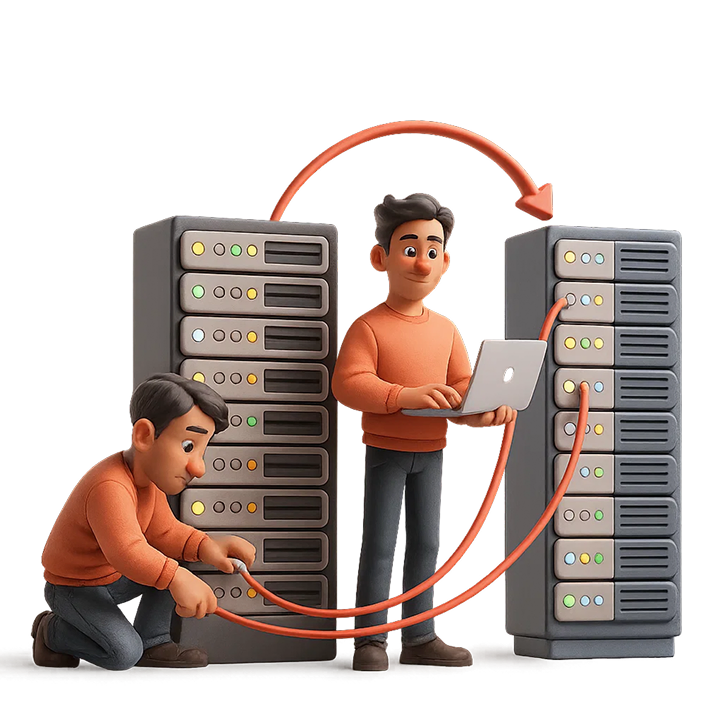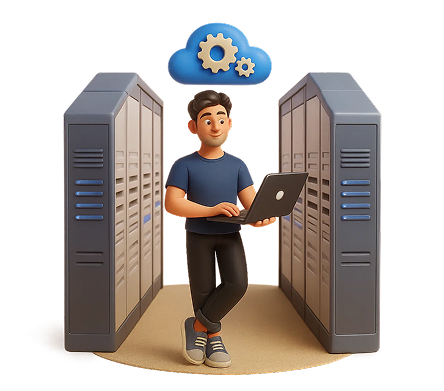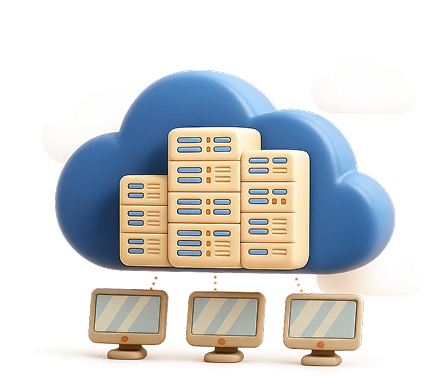Server Migration Services
At Exinent, we offer comprehensive Server Migration Services tailored to your business needs. Whether you’re moving to a new hosting provider, upgrading infrastructure, or shifting to the cloud, our certified migration experts ensure a smooth, secure, and downtime-free transition.

A few of our Clients



Assessment & Planning
Assessment & Planning
Analyze your current setup to identify the best migration strategy.

Data & Application Migration
Transfer files, databases, applications, and settings securely.

Platform-to-Platform Migration
Migrate across different operating systems and hosting platforms.

Cloud Server Migration
Move from on-premises to cloud or between cloud platforms like AWS, Azure, or GCP.

Email Server Migration
Migrate mailboxes, user settings, and archives without losing emails.

Testing & Validation
Post-migration performance testing and validation to ensure everything works flawlessly.

24/7 Monitoring & Support
We’re here even after migration to make sure everything runs smoothly.

Move Your Servers Without the Stress
Seamlessly migrate physical or virtual servers to the cloud or across platforms without disruption.

Why Choose Exinent for Server Migration?

End-to-End Migration Support
From planning to execution and post-migration support, we manage the entire migration lifecycle.

Zero Downtime Guarantee
We ensure continuous availability and minimal disruption to your operations during migration.

Security-First Approach
Our team prioritizes data integrity and implements the latest security practices to protect sensitive information.

Cross-Platform Expertise
We specialize in Linux, Windows, AWS, Azure, Google Cloud, Dedicated Servers, and more.
Who Needs Server Migration?

eCommerce Businesses expanding their product catalog or experiencing traffic surges.

SMBs & Enterprises upgrading to cloud infrastructure for better scalability.

Companies facing high downtime, outdated server hardware, or increasing hosting costs.

Businesses undergoing mergers or acquisitions needing infrastructure consolidation.
Benefits of Server Migration with Exinent

Improved performance and loading speed

Enhanced data security and compliance

Scalability for future growth

Lower operational and infrastructure costs

Access to the latest technologies and automation tools
Our Process
Frequently Asked Questions
Getting started with Exinent’s Cloud Migration Services is simple. Visit www.exinent.com to schedule a free consultation and request a cloud readiness assessment. Our certified experts will evaluate your current infrastructure, identify migration opportunities, and create a tailored roadmap to ensure a smooth, secure, and cost-effective migration to the cloud. Whether you’re moving to AWS, Azure, or Google Cloud, Exinent ensures a seamless experience from planning to post-migration support.
Yes, Exinent can migrate your legacy systems to the cloud with a secure and seamless approach. Our team specializes in modernizing outdated IT infrastructure by transferring legacy applications, data, and workloads to leading cloud platforms like AWS, Google Cloud, and Microsoft Azure. We begin with a thorough assessment of your existing systems to identify compatibility, dependencies, and risks. Then, we develop a tailored migration plan that minimizes downtime and ensures business continuity. Whether it’s rehosting, re-platforming, or refactoring, Exinent uses proven strategies and automation tools to streamline the process. Post-migration, we offer continuous support, performance optimization, and cost management to help you get the most from your cloud environment. By moving your legacy systems to the cloud, you can enhance scalability, security, and operational efficiency. Exinent’s cloud migration services are designed to future-proof your business and enable digital transformation with minimal disruption.
Yes, you can migrate from one cloud provider to another. This process is known as cloud-to-cloud migration and involves transferring your applications, data, and services from your current cloud platform (such as AWS, Azure, or Google Cloud) to a different provider. Businesses choose to migrate for reasons like cost optimization, better performance, improved security, compliance, or access to specific tools and services offered by the new provider.However, cloud migration can be complex and requires careful planning. Key steps include assessing your current infrastructure, identifying compatible services, ensuring data integrity, minimizing downtime, and maintaining security during the transition. Tools and services offered by cloud providers, or expert assistance from cloud migration partners like Exinent, can simplify the process. With the right strategy and support, migrating between cloud platforms can lead to increased efficiency, scalability, and cost savings for your organization.
The cost of cloud server migration varies widely depending on several factors, including the size and complexity of your infrastructure, the type of migration (lift-and-shift, re-platforming, or re-architecting), data volume, security requirements, and the cloud provider chosen. For small businesses with minimal infrastructure, costs may start from a few hundred dollars. However, for medium to large enterprises, cloud migration can range from $5,000 to $100,000 or more. Additional expenses may include third-party tools, hiring cloud experts, training staff, and ongoing optimization. Many cloud providers like AWS, Azure, and Google Cloud offer free tiers or credits to reduce initial costs. To get an accurate estimate, it’s essential to perform a cloud readiness assessment and work with experienced professionals who can create a tailored migration plan. Investing in expert migration services helps avoid hidden costs, minimize downtime, and ensure long-term performance and scalability in the cloud.
The duration of a cloud server migration depends on various factors, including the size and complexity of the infrastructure, the amount of data being transferred, and the migration strategy used. On average, a simple migration can take a few days to a couple of weeks, while larger or more complex environments may take several weeks to a few months.Key stages such as assessment, planning, testing, data transfer, and validation all contribute to the timeline. For example, a lift-and-shift migration is typically faster than a full re-architecture. Downtime requirements, compliance checks, and third-party integrations can also affect the schedule.To ensure minimal disruption and a smooth transition, experienced providers like Exinent follow a phased approach, including thorough pre-migration planning and post-migration testing. Working with a trusted partner helps reduce delays and ensures your business continuity throughout the process. Always consult with your cloud migration expert for a tailored timeline.
Downtime during migration depends on the complexity of your infrastructure and the migration strategy used. At Exinent, we prioritize minimizing or completely eliminating downtime by using proven migration techniques such as live data transfer, replication, and phased cutovers. For most businesses, we perform migrations during off-peak hours or use hybrid approaches to ensure systems remain operational while data is moved. However, in certain scenarios—like legacy system upgrades or full re-platforming—some brief downtime may be unavoidable. In such cases, we provide detailed scheduling and communication to reduce business disruption. Our team works closely with your IT staff to test, validate, and ensure a smooth transition with minimal risk. We also implement rollback plans and real-time monitoring for added confidence. Ultimately, our goal is to deliver a seamless migration experience with as little interruption to your operations as possible. Contact us to assess your environment and plan a zero-downtime strategy.
Choosing Exinent for cloud server migration ensures a secure, seamless, and cost-effective transition tailored to your business needs. With over a decade of experience in cloud technologies, Exinent offers end-to-end migration services—from assessment and strategy to implementation and optimization. Our certified cloud experts specialize in AWS, Azure, and Google Cloud, ensuring your workloads are migrated with minimal downtime and zero data loss. We prioritize performance, security, and compliance throughout the migration process. Whether you’re rehosting, refactoring, or re-platforming, Exinent delivers a customized approach aligned with your goals. Post-migration, we offer continuous monitoring and support to ensure your cloud infrastructure remains optimized and future-ready. Our proven track record with enterprises across industries makes us a trusted partner for digital transformation. When you choose Exinent, you’re not just moving servers—you’re unlocking scalability, efficiency, and innovation in the cloud. Let us help you accelerate your cloud journey with confidence.
Cloud server migration is the process of moving data, applications, and IT resources from on-premises servers, legacy systems, or one cloud environment to another cloud infrastructure. This transition allows businesses to take advantage of the cloud’s flexibility, scalability, and cost-effectiveness. The migration can involve shifting workloads to public, private, or hybrid cloud environments depending on business needs. Common cloud platforms include Amazon Web Services (AWS), Microsoft Azure, and Google Cloud Platform (GCP).Cloud server migration typically involves several stages, including assessment, planning, data transfer, testing, and optimization. Organizations migrate to the cloud to improve performance, enhance security, enable remote access, reduce hardware costs, and support digital transformation initiatives. Successful cloud migration ensures minimal downtime, data integrity, and improved system efficiency. With expert support, businesses can achieve a smooth and secure migration, unlocking new opportunities for growth and innovation in the cloud environment.
